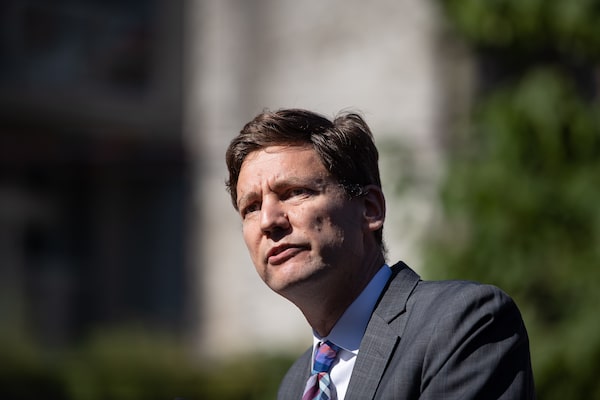
Victoria Mayor Lisa Helps attends a vigil in Victoria, B.C., on Jan. 31, 2017. Ms. Helps says B.C. mayors had been hearing since the beginning of the pandemic from residents and businesses that their downtown cores were seeing an uptick in crime and disorder.CHAD HIPOLITO/The Canadian Press
The mayors of the 13 largest cities on Canada’s West Coast have told the province the justice system has failed to stop a tiny number of people from committing a large number of crimes and making others feel unsafe in their communities.
In an April 5 letter to provincial Attorney-General David Eby, the British Columbia Urban Mayors’ Caucus said police data from nine cities showed that each had 10 to 50 offenders stuck in a “catch and release justice cycle.”
Victoria Mayor Lisa Helps, co-chair of the caucus, said the group met with Mr. Eby and Solicitor-General Mike Farnworth three days later, and is working with the province on solutions. (The Opposition BC Liberals leaked the letter this week.)
Ms. Helps said mayors had been hearing since the beginning of the pandemic from residents and businesses that their downtown cores were seeing an uptick in crime and disorder. She said the police data gave her and her counterparts an “aha moment.”
“We’ve been a caucus for two years and we had been talking in anecdotes, but when we got presented the data, we were like ‘Wow, these stories that we hear and the things that we feel are represented very clearly here in the numbers,’” Ms. Helps said on Wednesday in a phone interview.
Victoria police, for example, found 10 people either considered a suspect or charged in 1,385 incidents over the past two years, according to the letter. Ms. Helps said many of the people highlighted in the data are arrested for petty crimes such as shoplifting and appear to have serious mental health issues. They are often released on bail and ordered to stay away from a certain area, for example, but are not given any health care supports, she said.
“Our businesses and some of our downtown residents are fed up and they don’t like seeing their fellow human beings in these traumatic states - walking down the street yelling at themselves or yelling at others and then smashing a window,” she said. “... It’s a hard thing to witness in our fellow humans, being so troubled.”
The mayors say they are happy the latest provincial budget set aside funding for 20 new housing facilities to offer complex care to people caught up in the criminal justice system, but they want better help and adequate consequences for these prolific offenders.

B.C. Attorney-General David Eby told The Globe on Wednesday that his government is creating more incentives for prosecutors to fill vacancies in northern and rural areas.DARRYL DYCK/The Canadian Press
For example, the letter says B.C. should create more community courts to divert some away from jail time and into treatment. The mayors offered other ideas in their letter, including stricter bail conditions for those who repeatedly damage property, and investing more in the Crown Prosecution Service, which is under strain and producing outcomes that are “discouraging for police and community alike.”
Mike Morris, a former RCMP leader in northern British Columbia and the BC Liberal critic for public safety and the solicitor-general, called on the provincial NDP government to increase the number of Crown staff by 30 per cent to contend with the crushing caseload, which he acknowledged was exacerbated by federal legal reforms aimed at limiting jail time for violations of bail conditions.
Mr. Eby told The Globe on Wednesday that his government is creating more incentives for prosecutors to fill vacancies in northern and rural areas. He said the province is working with the mayors and will likely ask a group of experts to review the issue quickly and provide recommendations “about how we can be creative in responding to this.”
Public safety will likely be a prominent issue come October in civic elections.
Vancouver City Council voted against a motion Wednesday evening that would have asked staff to work with the police department to deploy CCTV cameras in certain areas to deter violent crime. Councillor Melissa De Genova’s motion proposed that this surveillance system be used only to provide evidence after an incident. The proposal also called for staff to consult police and B.C.’s Information and Privacy Commissioner to assess the impact on people’s privacy.
Last month, Vancouver announced it will spend nearly half a million dollars on new strategies to tackle homelessness, poverty and mental health in three central city neighbourhoods, spurred by concerns that have multiplied during the pandemic from some residents and business owners.
We have a weekly Western Canada newsletter written by our B.C. and Alberta bureau chiefs, providing a comprehensive package of the news you need to know about the region and its place in the issues facing Canada. Sign up today.
 Mike Hager
Mike Hager